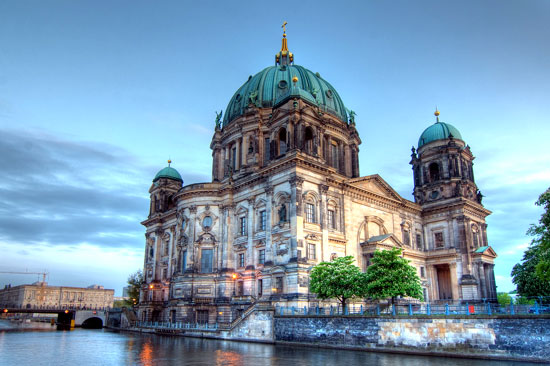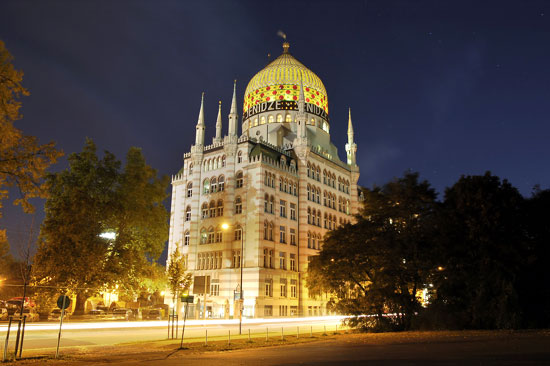Culture and Society: Religion Overview
Religions of the Country
Christianity is the predominant religion in Germany. A small percentage follow Islam or are divided among smaller religious groups such as Jews, Buddhists, Jehovah’s Witnesses, and Hindus. The remaining numbers are either atheists or unaffiliated with any religious group.
Germany’s Christian population is mostly divided among Roman Catholics, Protestants, and Orthodox believers. The Protestants are primarily Lutherans, Unitarians, Baptists, Pentecostals, Methodists, and the New Apostolic Church. The Orthodox Church is made up of the Greek Orthodox/Constantinople Patriarchate, Serbian Orthodox, Syrian Orthodox, Armenian Church, Ethiopian Church, Romanian Orthodox, Assyrian Orthodox, and the Russian Orthodox/ Moscow Patriarchate.
Basic Tenets
One of the basic tenets of Christianity is the belief that the Bible is the revealed word of God written under the inspiration of the Holy Spirit. Most Christian groups are monotheistic, with the belief that the one God is represented in three aspects: the Father, the Son (Jesus Christ), and the Holy Spirit, collectively known as the Holy Trinity. For most Protestants, an individual’s faith in God and study of the Bible are the most important means of salvation. The Orthodox and Roman Catholic Churches, however, also consider Church teachings and sacraments as valid sources of truth and grace. The Eastern Orthodox Church is divided into several jurisdictions; Germany does not have a historical affiliation with any particular one.
Spiritually Devout or Nominal
Religion is of minor importance in Germany. The third largest religious group after Protestants and Catholics are agnostics and atheists. The number of people leaving the country’s various churches has been increasing and the number of baptisms and confirmations has been decreasing every year. In some regions, less than 20 percent of the population has been baptized.
Religious Conflict
The Jewish community in Germany is a perennial target for attacks by neo-Nazis and, to a certain extent, Islamic groups. There has also been a degree of conflict between Muslims and local residents in areas with a high concentration of Muslims. These conflicts are mostly nonviolent and generally relate to various Islamic rules and practices that adversely affect women. One of Germany’s federal states (Baden-Württemberg) is now requiring Muslim applicants for citizenship to answer questions about their attitudes on homosexuality and domestic violence. Polling data has indicated a deep current of anti-Islamic sentiment in the country.
Secularism
Germany is an officially secular country and is home to a large number of atheists and people who are unaffiliated with any particular religion or religious group. While there is no formal secular movement, some organizations actively resist the influence of religion in society.
Superstitions
There are a number of religious superstitions in Germany: bathing in cold water on the first day of Easter will bring the person good health for the remainder of the year; clothing sewn with thread spun on Christmas Eve will repel insects; a maiden who knocks on a chicken coop on Christmas Eve will get married during the coming year if the rooster cackles and will have to wait another year if a hen cackles; if a dog barks on Saint Andrew’s Eve, a girl’s future husband will hail from the area in which she lives; if a girl pulls a log out from a stack of wood on Christmas Eve, her lover’s fidelity will be seen in the log’s shape (i.e., straight or crooked).
Religious Clerics
Religious clerics do not command widespread influence or authority over the general population. Religious clerics are mostly regarded as necessary only when there are religious rituals to be performed. However, clerics are exempt from holding public office, from military service (except as chaplains), and from serving as assessors and jurors.
Lay people wishing to join the Roman Catholic or Orthodox clergy are required to attend religious schooling. Certain other denominations require at least a bachelor’s degree in theology as a prerequisite for ordination. There are a number of prominent theological colleges and seminaries in Germany. Pope Benedict XVI taught at the Theologische Hochschule Freising and was a member of several other schools of theology at Germany universities.
State Regulations
Religious clerics in Germany are neither regulated nor paid by the state.
Religion and Public Life
Religion has very little impact in Germany, although most German holidays are religious in nature and the country’s largest political party calls itself the Christian Democratic Union. The churches are fast losing members and the numbers of people who call themselves "secular" is constantly on the increase. The impact of the church is so low that anyone who believes in the Bible literally is likely to be ridiculed.
While religiousness as such is not looked down upon, only a certain abstract kind of religious identity is accepted. This can be attributed to a long history of German skepticism of religious authority, a tradition of belief in science and rationalism, and the country’s position as the birthplace of modern socialism.
Religious Holidays and Ceremonies
The religious holidays officially recognized in Germany are Good Friday, Easter Monday, Ascension Day, Whit Monday, Christmas, and St. Stephen’s Day. The religious holidays of minority religions are not officially recognized by the state.
The most important religious ceremonies in German culture are baptisms, confirmations, communion (Eucharist), weddings, and funerals. Even nominal Christians will baptize their children, have church weddings, and hold funeral services at churches.
Government and Religion
The government of Germany guarantees religious freedom as provided for in the Constitution and, in general, allows all religious groups the freedom to practice their beliefs. The government is not formally aligned with a religion or sect and there is a clear separation between church and state.
The government is neither anti-religious nor controlling in its supervision of religious groups. Religious freedom, however, is allowed only up to the point where it does not infringe upon human dignity and other basic human values.
Because Germany is a secular state, people appointed by or working for the government are considered government representatives and are not permitted to advertise their religious identity in any way. An example is barring government-appointed Muslim women teachers from wearing the headscarf to work.
Three religions are granted an "official" status. At the beginning of the 21st century, Judaism was granted "official" status, putting it on the same legal level as the Roman Catholic and the Evangelical Church in Germany, even though there are less than 200,000 practitioners in the country.
Religious groups are not required to register. However, registered religious groups are provided a few privileges such as a limited degree of tax-exemption. The government provides state funding and subsidies to certain religious groups who have, in the past, suffered at the hands of the state or whose property was taken over by the state.
Persecution
The government does not persecute outside religions unless their teachings contain principles that conflict with those propagated by the state. Foreign missionaries and outside religious groups are allowed to practice their religious beliefs subject to certain conditions, including that they will not use force or violence for religious purposes. They are also prohibited from indulging in activities that are deemed to threaten the constitutional order of the state or affect the peaceful co-existence of people living in the country.
There are no laws against proselytizing or holding religious services, and it is legal to possess or display any religious items and materials. However, these items should not offend or mock other religious communities.
Religious Tolerance
Tolerance of various religions is generally high in modern German society. The Jews, however, often face harassment and attacks, mostly from neo-Nazi and extreme right-wing groups. The harassment includes defacing Jewish places of worship with Nazi symbols and graffiti, desecrating Jewish cemeteries, and physical assaults.
Muslims face a large degree of hostility as well. An early 21st century survey, for instance, revealed that most Germans linked Islam to the oppression of women, believe Islam is intolerant, and that there would always be "major conflicts" between Islam and Christianity.
All religious groups in Germany have contributed their bit to provide for amicable inter-relationships. Missionaries and foreign evangelical groups do not face problems or hostility from the local population.
Protocols for Foreigners
Foreigners are allowed to participate in the country’s religious activities and rituals.
Copyright © 1993—2025 World Trade Press. All rights reserved.

 Germany
Germany 


